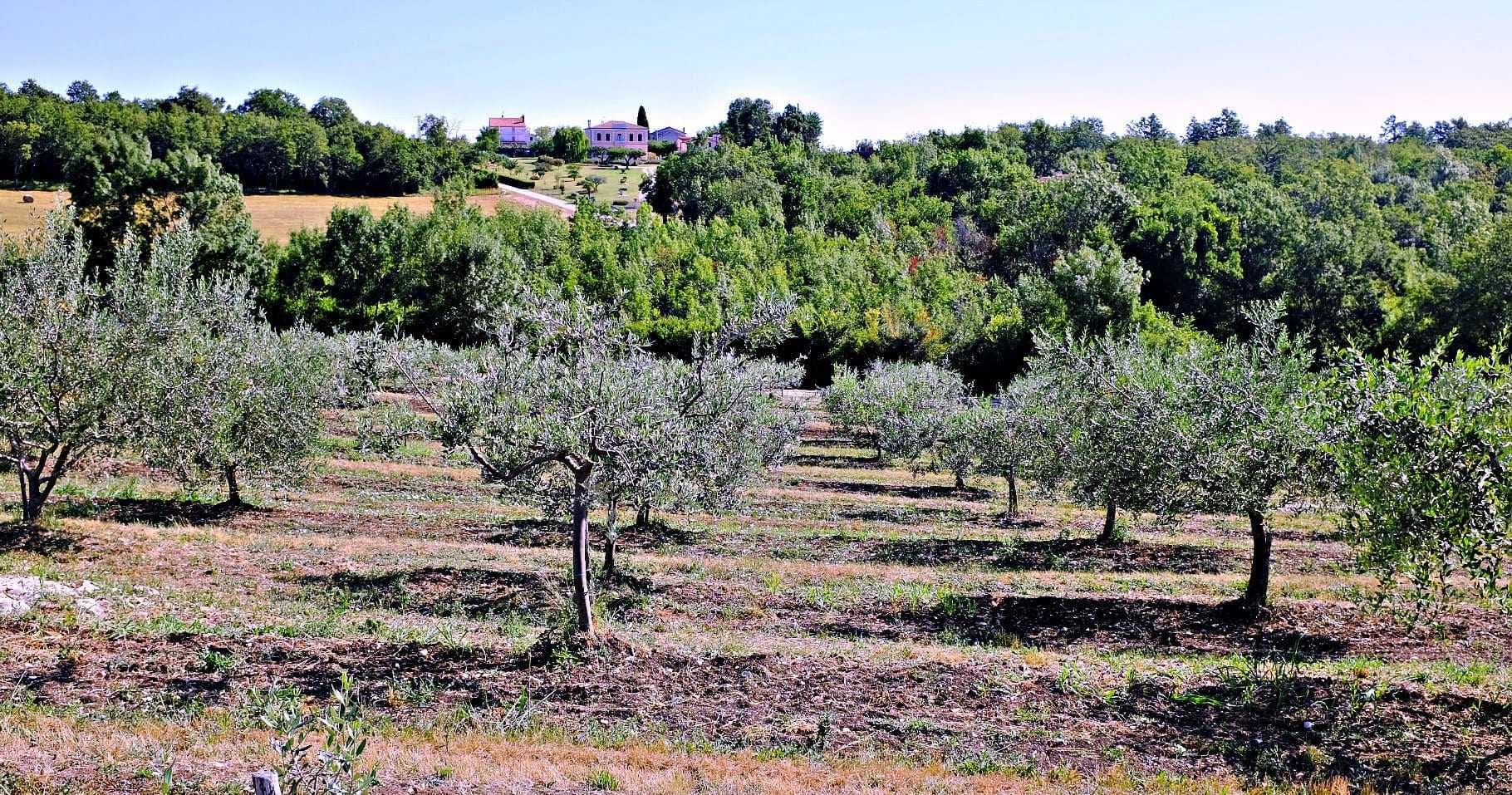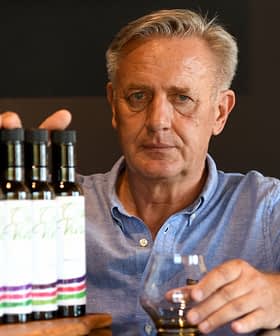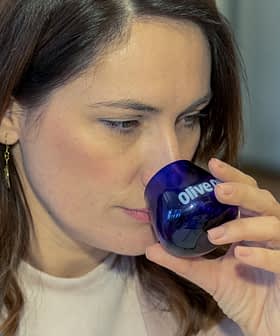Oliva Lucia: A Tale of Love, Loss and Leccino in Istria
Behind Oliva Lucia is a story of resilience: how one woman overcame the challenges of life and nature to become the producer of an award-winning olive oil.
 Award-winning olive oil producer, Mili Kus (Photo: Isabel Putinja)
Award-winning olive oil producer, Mili Kus (Photo: Isabel Putinja)When I interviewed some of the Croatian olive producers who won awards at the 2017 New York International Olive Oil Competition (NYIOOC), one of them stood out because she was neither a large, established producer nor a family that’s been in the business for generations, but a foreigner and a woman whose only family is her young grove of 1,500 olive trees.
It’s hard to figure out why some trees grow better than others. It’s a process of trial and error. I trust my observations.
While speaking to Mili Kus on the phone, the passion and enthusiasm she has for her trees and the high-quality oil she produces were communicated through her warm, friendly voice. Every grove and producer have a story.
I went to visit Mili’s olive plantation in northern Istria to learn more about the woman and grove behind Oliva Lucia, an organic medium blend that won a Silver Award at NYIOOC 2017.
Mili’s olive farm is situated in the northern part of the Istrian peninsula, a region of rolling hills that’s often described as Croatia’s Tuscany — not only because of its stunning natural landscape but also its many gastronomic delights: high-quality wine and olive oil are produced here, and highly-prized black and white truffles grow in the fertile soil. Italian is even a second language as Istria was part of Italy between the World Wars. This is why the sign pointing the way to Kukov Vrh also indicates its Italian name: Monte Cucco.
Covering an area of six hectares, Mili’s grove is located at the base of this tiny village with the scenic hilltop town of Buje visible towards the east. The Adriatic Sea is just nine kilometers away in the opposite direction, while the Slovenian border is less than 10 kilometers to the north.
Born in Toronto, Mili is a Canadian of Slovenian origin who used to work as a stockbroker before life took an unexpected turn and eventually took her to Croatia where she’s now a full-time olive oil producer.
Tragically, only 18 months after her wedding she suddenly lost her husband to a quick and fatal illness. In 1992 she decided to leave Canada and start a new life in Slovenia, the country of her parents’ birth. Here she worked in investment management for many years but while on a fateful holiday on the Croatian island of Iž, she met Slavko, a widower with two young children who would become her second husband.
Mili had no experience in olive production before she married Slavko, but it quickly became her passion.
“When I bought this land in 2005, it was covered in forest, meadow and marsh,” she told me as we walked through her groves. “I saw the olive farm as a retirement project for my second husband who grew up with olive trees on the Dalmatian island of Iž. I respect the olive. It has its own intelligence. The olive tree is able to survive hundreds and even thousands of years without the aid of humans.”
It was from Slavko that she learned the basics of olive farming. The couple painstakingly carved the grove out of virgin forest and pasture land filled with large rocks and planted the first olive samplings themselves 11 years ago.

Mili Kus’ farm near Kukov Vrh (Phtoto: Isabel Putinja for Olive Oil Times)
“The first year the deer ate everything,” she recounted of the early days, “we also got wild boar digging up the natural fertilizers and had to fence the land to keep them out. The grove is made up of three different types of soil and we quickly learned that it also has three different micro-climates.”

Oliva Lucia
Mili faced another tragic loss when Slavko lost his life to cancer three years ago and she found herself alone with the 1,500 trees they had planted and nurtured together. She continues the labor of love they started on her own, tending to the groves herself with help from only one worker and a few locals who give her a hand during the harvest season. In the summer she’s in her groves just after sunrise at 5:30 am and works steadily until 9 am when the heat of the day sets in.
Without her husband’s knowledge as a guide, she lets her observations and experiences be her teacher.
“It’s hard to figure out why some trees grow better than others,” she conceded. “It’s a process of trial and error. I trust my observations. I’ve discovered that aggressive pruning works and so does tilling the earth regularly. Through the years I have realized that my trees grow best on the eastern slope of the grove: the first rays of light seem to be especially beneficial for the trees.”
See Also:This Year’s Best Olive Oils from Croatia
“But the biggest problem I have is water,” she revealed, gesturing towards the lower reaches of the grove. She wasn’t referring to drought conditions or the challenges of irrigation but to the problem of waterlogging in some areas of the grove: “The lower regions are generally much wetter in the spring and autumn seasons,” she explained. “To manage this we have built one kilometer of underground and open drainage canals to funnel rainwater into a pond as well as a concrete reservoir with a 100,000-liter capacity.”
The many massive rocks that were uncovered after digging up the land were put to good use this way by creating the channels for the drainage canals. They were also recycled into pulverized dust and mixed into the soil to enrich it with calcium and minerals. “This rocky land is truly surprising,” Mili said, pointing to a particularly large and peculiarly shaped boulder that she kept as a keepsake. “My husband loved stone. We dug up so many large rocks and for a long time, they were just lying around. I decided to put them to good use by reusing them in these different ways.”
Just over half of the trees growing on the farm are of the Leccino variety, while the others are made up of Frantoio, Moraiolo, Pendolino and Bianchera. In 2009, three years after planting, the grove yielded its first harvest and from then on it has been an accumulation of important milestones.
The farm received organic certification in 2014, and last year Mili experienced an exceptional harvest, increasing her yield three-fold. This good fortune was followed by the silver award at NYIOOC 2017, a prize that came after already winning gold, silver and bronze medals on the national level for Oliva Lucia, a medium extra virgin blend with delightfully fruity notes. The name under which the oil is marketed is a touching homage to Slavko’s teenage daughter who had died in a car accident.
The story of this olive grove tucked into a picturesque corner of the lush Istrian peninsula is one of love, loss and grief, and trial and error. But love clearly prevails, with the trees’ bountiful fruit and high-quality oil as proof. “I didn’t realize at first how much work it is and I didn’t really know what I was getting into,” Mili said of her initial experiences as a new olive grower. “It really is a lot of hard work. But I feel like I’m heading in the right direction.”
Oliva Lucia’s brand new website is now online, Mili is currently talking with a distributor, and is finalizing plans to build an on-site tasting room where she can welcome lovers of good olive oil.
Despite the many challenges of the past, the future looks bountiful.








